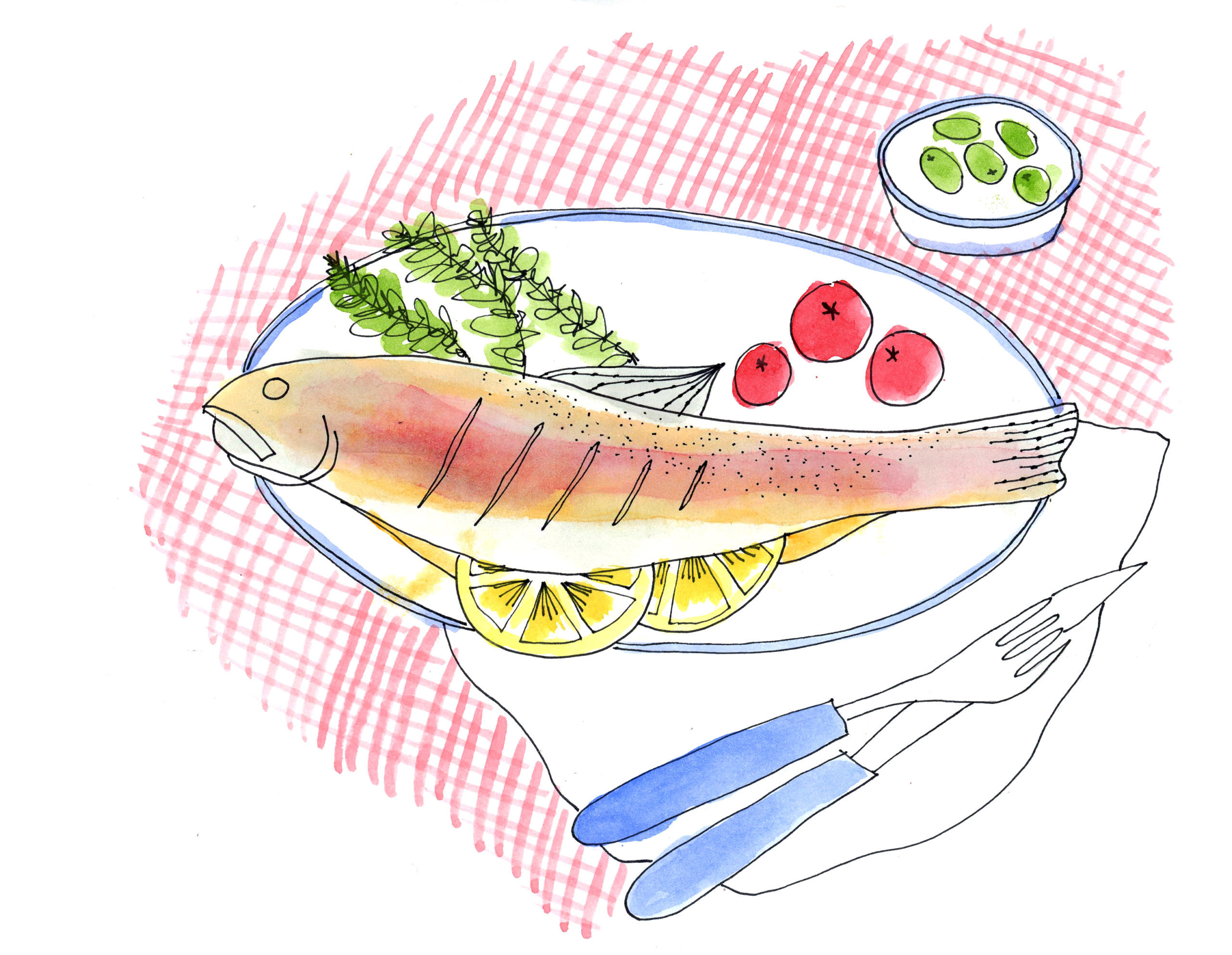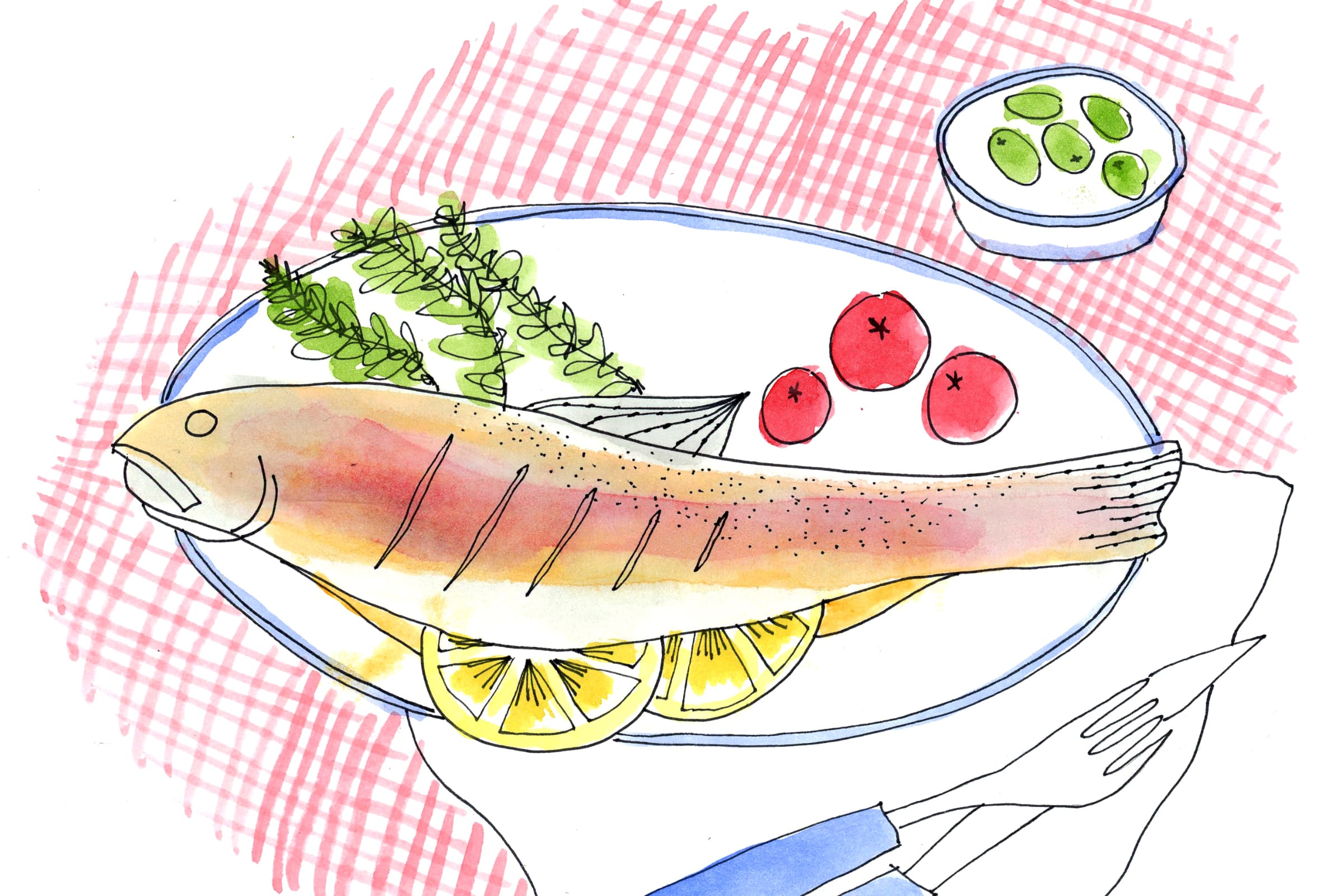It was generally understood, growing up Catholic in St. Paul, that you ate fish on Fridays as a form of sacrifice. For one day, you were to set aside the self-indulgence and the faintly sin-sullied physical satisfactions of dripping hamburgers and bleeding steaks for the prim virtues of a fillet of fish.
There were still dangers, even then. There was a smell we called “fishiness,” with distantly poisonous associations. And there was, of course, the widely acknowledged scourge of asphyxiation by tiny translucent bones.
Fortunately, schools of walleye hovered deep below the slate gray waves of Minnesota’s frigid and beautiful lakes. And a walleye fillet was scentless, boneless and as mild as a communion host. It was barely even flesh — more a sort of edible alabaster. A perfect Virgin Mary of a fish. So we ate walleye most Friday nights, quickly and with determination. Like shaking hands after a first date. Or sex for procreation.
It wasn’t until I was 21 that I first ate a trout, in Paris, on a luncheon field trip with a group of old people. I was in the middle of an internship with the Little Brothers of the Poor. Our mission was to comfort elderly Parisians whose physical needs were mostly addressed by the French Republic, but whose loneliness and isolation were not.
I remember a lawn, a very hot sun, and improvised banquet tables and folding chairs. One of those dispiriting, arranged entertainments that are like trying to create actual fun by saying “This is fun” over and over for an hour or two.
I sat next to Albert (“ahl-BEAR”), although he was better known by his diminutive, Bébert (“bay-BEAR”). Bébert spoke a fast slurred French through his dentures. He always wore a white shirt, more or less clean (often less), a dark wool sport coat, and a derby cap on his liver-spotted head. A slight hunch and a thin blade of a nose made him look like a bird of prey staring out from a cloak of wings. He stood about five foot nothing, and I loomed over him in a way that made me feel even more American than I no doubt already looked, in boot-cut Levi’s, a flannel shirt and 1980s feathered, center-parted hair.
Every time I walked into a room, he announced that le Ricain was present — short for Américain, meaning “Yank,” with associations (almost none of them complimentary) dating back to post-war American muscle flexing and a contemporaneous nod to the perceived chauvinism of Reagan’s America.
I don’t remember what I ordered, but Bébert ordered a trout. As a reflection of the culinary shelteredness of my early life, it was not just the first trout I, on sabbatical from my junior year of college, had ever seen in person, but the first fish of any kind I had ever seen served whole.
I had been led to think of Bébert as a charge, someone I needed to take care of — an enfeebled and lonely old man with a child’s name, an angry streak and a comically venomous tongue. I may have even thought of my young man’s physical strength as something that, having placed me in the position of caretaker, also conferred upon me some sort of superiority.

Illustration by Eva Hoffman
But now he took a knife that oscillated like an idling motor and aimed it at the base of the fish’s head. He pierced the skin of the shoulder, and with the leverage this now gave him, his hand suddenly stopped quaking. He slit down through the crackling skin along the trout’s back with a patient sort of aplomb, then slipped the tip of the knife between the flesh and the bone at the base of the fish’s tail, and with a sure but careful series of prods and lifts with knife and spoon, removed the entire top fillet from the skeleton, skin still attached, and set it aside.
He carefully scraped away the spiny dorsal fin from the now exposed ossature and — in a moment of pure magic that I have since worked to master but that has never had the same effect as this first time — he took hold of the fish’s tail with his left hand, worked his knife underneath the base of the tail where the flesh met the fin, pried free a small tab of meat and pinned it there with his knife. Then, in a single, slow, theatrical gesture, he lifted the spine, the ribs and all of the hair-like pin bones, along with the head, free from the peach-colored bottom fillet, which remained whole, moist and lightly steaming.
With a small rivulet of sweat creeping down his temple from under the band of his wool cap, he transferred one of his fillets to my plate, flavored by the crisped skin and the browned butter from the pan — and also, no doubt, by its wondrous presentation. An entire cultural education seemed to me to be present in this simple, elegant and useful act, performed as second nature, as if this were one of adulthood’s inevitable and natural acquisitions.
Trout, for me, had always been tied to mysterious and sophisticated realms: to fly-fishing, to knowledge of moving water and the outdoors generally, to elevated eating, to a certain kind of manhood — self-assured and gentle-hearted — to which I aspired.
Albert’s agile dismantling of this trout scrambled whatever hierarchy had established itself between us. It showed him to be in touch, in a way I was not, with both the elemental and the artful — two poles between which skinless walleye fillets existed in a sort of bloodless no man’s land.
Albert, I thought to myself, would have known how to dance. He would have known how to kiss and where, while kissing, to place his hands. He would have known what to uncork with lamb. I felt large and powerful and a bit oafish beside him.
He showed me how to gracefully slip spoonfuls of pink muscle from silvery skin and encouraged me to let the trout linger a moment in my mouth, so that its yielding firmness, its fatty luxuriance and its elusively vegetative freshwater aromatics might be properly appreciated. He took a sip of lunchtime wine then returned to his trout.
It was a first tipping of the scale. An invitation to understand eating as both an aesthetic event and a way of engaging with the bones and entrails of the world. From that trout descended all of the tongues, the tripe, the roe, the sweetbreads, the joints, the gizzards, the kidneys, the hearts and the livers that have taken a life of eating from a squeamish examination of flakes of white fish meat into a way of loving the world completely while reveling in the terms of life and death.
I was more grateful to Bébert than our relationship, and to some extent my French, would allow me to express. But I was happy that day to be his student and his companion, a fellow eater of trout for the space of a meal that reduced age and nationality to small-minded trifles. I could not tell him that then. And it is time to rectify that lapse.
Thank you, Bébert.
Affectionately, Le Ricain.


